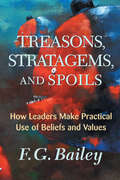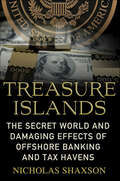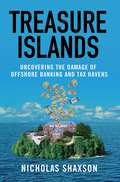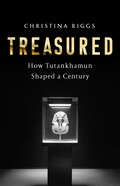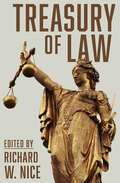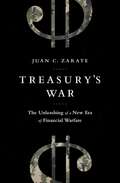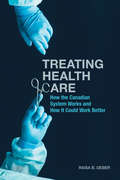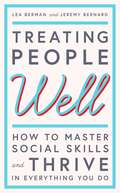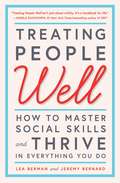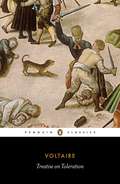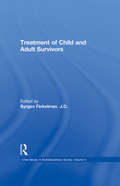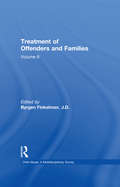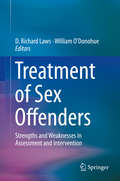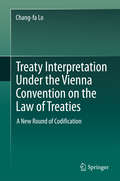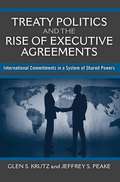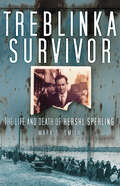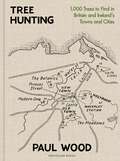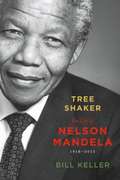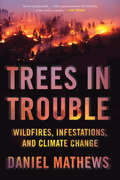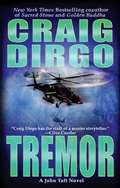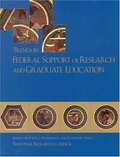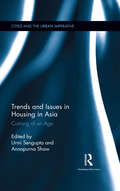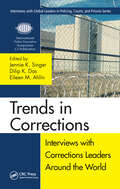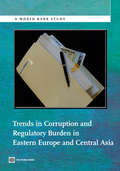- Table View
- List View
Treasons, Stratagems, And Spoils: How Leaders Make Practical Use Of Beliefs And Values
by F. G. BaileyTreasons, Stratagems, and Spoils is a sequel to the author's highly regarded Stratagems and Spoils.Treason, the new word in the title, indicates a heightened attention to morality?to ideas of duty and conscience?as a foil to rational calculations of advantage. By providing sets of propositions and questions that illuminate narratives of political events, this book helps anyone interested in struggles for power understand politics and political leaders in their own and in other cultures. The method can be used to make sense of power struggles in peasant villages, electoral and presidential maneuvering in the United States, the confusions of post-Soviet Eastern Europe, or Gandhi's morality deployed as a weapon to drive the British out of India.
Treasure Islands: The Secret World and Damaging Effects of Offshore Banking and Tax Havens
by Nicholas ShaxsonA thrilling ride inside the world of tax havens and corporate mastermindsWhile the United States experiences recession and economic stagnation and European countries face bankruptcy, experts struggle to make sense of the crisis. Nicholas Shaxson, a former correspondent for the Financial Times and The Economist, argues that tax havens are a central cause of all these disasters.In this hard hitting investigation he uncovers how offshore tax evasion, which has cost the U.S. 100 billion dollars in lost revenue each year, is just one item on a long rap sheet outlining the damage that offshoring wreaks on our societies. In a riveting journey from Moscow to London to Switzerland to Delaware, Shaxson dives deep into a vast and secret playground where bankers and multinational corporations operate side by side with nefarious tax evaders, organized criminals and the world's wealthiest citizens. Tax havens are where all these players get to maximize their own rewards and leave the middle class to pick up the bill.With eye opening revelations, Treasure Islands exposes the culprits and its victims, and shows how:*Over half of world trade is routed through tax havens*The rampant practices that precipitated the latest financial crisis can be traced back to Wall Street's offshoring practices*For every dollar of aid we send to developing countries, ten dollars leave again by the backdoorThe offshore system sits much closer to home than the pristine tropical islands of the popular imagination. In fact, it all starts on a tiny island called Manhattan. In this fast paced narrative, Treasure Islands at last explains how the system works and how it's contributing to our ever deepening economic divide.
Treasure Islands: Uncovering the Damage of Offshore Banking and Tax Havens
by Nicholas ShaxsonA troubling look inside the world of tax havens and corporate masterminds. While the United States experiences recession and economic stagnation and European countries face bankruptcy, experts struggle to make sense of the crisis. Nicholas Shaxson, a former correspondent for the Financial Times and The Economist, argues that tax havens are a central cause of all these disasters. In this hard hitting investigation he uncovers how offshore tax evasion, which has cost the U. S. 100 billion dollars in lost revenue each year, is just one item on a long rap sheet outlining the damage that offshoring wreaks on our societies. In a riveting journey from Moscow to London to Switzerland to Delaware, Shaxson dives deep into a vast and secret playground where bankers and multinational corporations operate side by side with nefarious tax evaders, organized criminals and the world's wealthiest citizens. Tax havens are where all these players get to maximize their own rewards and leave the middle class to pick up the bill. With eye opening revelations, Treasure Islands exposes the culprits and its victims, and shows how: *Over half of world trade is routed through tax havens *The rampant practices that precipitated the latest financial crisis can be traced back to Wall Street's offshoring practices *For every dollar of aid we send to developing countries, ten dollars leave again by the backdoor The offshore system sits much closer to home than the pristine tropical islands of the popular imagination. In fact, it all starts on a tiny island called Manhattan. In this fast paced narrative,Treasure Islands at last explains how the system works, how it's contributing to our ever deepening economic divide, and what we might do to reform the system and effect positive change.
Treasured: How Tutankhamun Shaped a Century
by Christina RiggsA bold new history of the discovery of King Tut and the seismic impact it left on modern society. When it was discovered in 1922, in an Egypt newly independent of the British Empire, the 3,300-year-old tomb of Tutankhamun sent shockwaves around the world. The boy-king became a household name overnight and kickstarted an international obsession that continues to this day. From pop culture and politics to tourism and the heritage industry, it&’s impossible to imagine the past century without the discovery of Tutankhamun – yet so much of the story remains untold. In Treasured, Christina Riggs weaves compelling historical analysis with tales of lives touched, or changed forever, by an encounter with the boy-king. Who remembers that Jacqueline Kennedy first welcomed the young pharaoh to America? That a Tutankhamun revival in the 1960s helped save the ancient temples of Egyptian Nubia? Or that the British Museum&’s landmark Tutankhamun exhibition in 1972 remains its most successful ever? But not everything about &‘King Tut&’ glitters: tours of his treasures in the 1970s were linked to Big Oil, his mummified remains have been exploited in the name of science, and accounts of his tomb&’s discovery exclude Egyptian archaeologists. Treasured offers a bold new history of the young pharaoh who has as much to tell us about our world as his own.
Treasury of Law
by Richard W. NiceThis anthology of historic legal documents ranges from the ancient Code of Hammurabi to the American Civil Rights Act. In this volume, Richard W. Nice has assembled a wealth of meaningful and significant documents that represent humanity&’s ever-evolving attempt to govern society by imposing laws. Drawn from ancient, medieval, and modern times, this anthology provides an enlightening overview of world history and legal theory, told entirely in primary documents. Some of the earliest attempts to regulate human behavior sprang from powerful, primitive religious influences that governed matters of ethics and morals, such as the Mosaic Code of Palestine. The first &“pure&” law can be traced back to the Law of the Twelve Tables, the forerunner of Roman Law, which in turn had an immeasurable effect on modern Western law. Organized by region and era, Treasury of Law is an essential volume for anyone curious about the evolution of legal codes and practices.
Treasury's War: The Unleashing of a New Era of Financial Warfare
by Juan C. ZarateFor more than a decade, America has been waging a new kind of war against the financial networks of rogue regimes, proliferators, terrorist groups, and criminal syndicates. Juan Zarate, a chief architect of modern financial warfare and a former senior Treasury and White House official, pulls back the curtain on this shadowy world. In this gripping story, he explains in unprecedented detail how a small, dedicated group of officials redefined the Treasury’s role and used its unique powers, relationships, and reputation to apply financial pressure against America’s enemies. This group unleashed a new brand of financial power--one that leveraged the private sector and banks directly to isolate rogues from the international financial system. By harnessing the forces of globalization and the centrality of the American market and dollar, Treasury developed a new way of undermining America’s foes. Treasury and its tools soon became, and remain, critical in the most vital geopolitical challenges facing the United States, including terrorism, nuclear proliferation, and the regimes in Iran, North Korea, and Syria. This book is the definitive account, by an unparalleled expert, of how financial warfare has taken pride of place in American foreign policy and how America’s competitors and enemies are now learning to use this type of power themselves. This is the unique story of the United States’ financial war campaigns and the contours and uses of financial power, and of the warfare to come.
Treating Health Care: How the Canadian System Works and How It Could Work Better
by Raisa DeberCanada has been among the world leaders in recognizing the multiple factors that impact health. Focusing on Canada’s health care system, Raisa B. Deber provides brief descriptions of some key facts and concepts necessary to understand health care policy in Canada and place it in an international context. An accessible guide, Treating Health Care unpacks key concepts to provide informed discussions that help us understand and diagnose Canada’s health care system and to clarify which proposed changes are likely to improve it - and which are not. This book provides background information to clarify such concepts as: determinants of health; how health systems are organized and financed (including international comparisons); health economics; health ethics; and roles and responsibilities of different stakeholders, including government, providers, and patients. It then addresses some key issues, including equity, efficiency, access and wait times, quality improvement and patient safety, and coverage and payment models. Using analysis rather than advocacy, Deber provides a toolkit to help understand health care and health policy.
Treating People Well: The Extraordinary Power of Civility at Work and in Life
by Lea Berman Jeremy Bernard'Lea and Jeremy’s stories from the White House are not only fascinating, but reveal lessons about the ways we treat one another that can be applied universally. No matter your beliefs, background or what you do for a living, there are takeaways from this book that will make each of us better human beings. By focusing on the things that unite us – love, kindness and empathy – Treating People Well has the power to change the world for the better.' Karlie Kloss, supermodel and founder of Kode With Klossy 'Treating People Well is an essential guide for getting along and getting ahead in our world today. Authors Lea Berman and Jeremy Bernard show us how people from opposite ends of the political spectrum and all walks of life can build relationships, earn trust, and succeed by treating others with civility and respect. Full of life lessons that are both timely and timeless, this is a book that will be devoured, bookmarked, and read over and over again.' John McCain, United States Senator 'I loved this book! Yes, as promised in the title, it shows you the value of treating people well and gives expert advice, but that is only part of it. The two authors – both former White House Social Secretaries in different administrations – provide fascinating glimpses of what’s behind the scenes at the White House. You’ll learn a lot while being vastly entertained.' Joan Ganz Cooney, founder, Sesame StreetWritten by two former White House Social Secretaries, Treating People Well is a guide to developing social skills in order to build more successful relationships. Using their unique access, the authors describe the behaviours that shape how an individual is perceived. While manners and etiquette may not seem relevant in today’s technology-burdened, politically contentious world, modern life has caused many people to feel disconnected and uncomfortable in their interactions with others. This essential book gives readers the tools to live each day more positively, forging connections based on trust and mutual respect. The authors offer advice such as how to develop confidence, be consistent, use humour, listen carefully, radiate calm, resolve conflicts quickly, be honest but never cruel, cultivate loyalty, own your mistakes, work with difficult people, and attend to details, whether in the office or at home, dealing with friends or colleagues, as a student, a new employee or an experienced executive. Working in the most charged workplace possible, Lea and Jeremy honed these skills over years, striving to apply kindness, empathy and genuine caring to achieve success.
Treating People Well: The Extraordinary Power of Civility at Work and in Life
by Laura Bush Lea Berman Jeremy BernardA guide to personal and professional empowerment through civility and social skills, written by two White House Social Secretaries who offer an important fundamental message—everyone is important and everyone deserves to be treated well.Former White House social secretaries Lea Berman, who worked for George and Laura Bush, and Jeremy Bernard, who worked for Michelle and Barack Obama, have written an entertaining and uniquely practical guide to personal and professional success in modern life. Their daily experiences at 1600 Pennsylvania Avenue taught them valuable lessons about how to work productively with people from different walks of life and points of view. These Washington insiders share what they’ve learned through first person examples of their own glamorous (and sometimes harrowing) moments with celebrities, foreign leaders and that most unpredictable of animals—the American politician. This book is for you if you feel unsure of yourself in social settings, if you’d like to get along more easily with others, or if you want to break through to a new level of cooperation with your boss and coworkers. They give specific advice for how to exude confidence even when you don’t feel it, ways to establish your reputation as an individual whom people like, trust, and want to help, and lay out the specific social skills still essential to success - despite our increasingly digitized world. Jeremy and Lea prove that social skills are learned behavior that anyone can acquire, and tell the stories of their own unlikely paths to becoming the social arbiters of the White House, while providing tantalizing insights into the character of the first ladies and presidents they served. This is not a book about old school etiquette; they explain the things we all want to know, like how to walk into a roomful of strangers and make friends, what to do about a difficult colleague who makes you dread coming to work each day, and how to navigate the sometimes-treacherous waters of social media in a special chapter on “Virtual Manners.” For lovers of White House history, this is a treasure of never-before-published anecdotes from the authors and their fellow former social secretaries as they describe pearl-clutching moments with presidents and first ladies dating back to the Johnson administration. The authors make a case for the importance of a return to treating people well in American political life, maintaining that democracy cannot be sustained without public civility. Foreword by Laura Bush
Treatise on Toleration
by VoltaireVoltaire's Treatise on Toleration is one of the most important essays on religious tolerance and freedom of thought A powerful, impassioned case for the values of freedom of conscience and religious tolerance, Treatise on Toleration was written after the Toulouse merchant Jean Calas was falsely accused of murdering his son and executed on the wheel in 1762. As it became clear that Calas had been persecuted by 'an irrational mob' for being a Protestant, the Enlightenment philosopher Voltaire began a campaign to vindicate him and his family. The resulting work, a screed against fanaticism and a plea for understanding, is as fresh and urgent today as when it was written.
Treatment of Child and Adult Survivors (Child Abuse: A Multidisciplinary Survey #5)
by J. D. Byrgen FinkelmanFirst published in 1995. Routledge is an imprint of Taylor & Francis, an informa company.
Treatment of Offenders and Families (Child Abuse: A Multidisciplinary Survey #Vol. 6)
by J. D. Byrgen FinkelmanFirst Published in 1995. Routledge is an imprint of Taylor & Francis, an informa company.
Treatment of Sex Offenders
by D. Richard Laws William O'DonohueThis rigorous survey offers a comprehensive rethinking of the assessment and treatment of sexual offenders for a bold challenge to practitioners. It critiques what we understand about offenders and the mechanisms of offending behaviors, and examines how this knowledge can best be used to reduce offending and relapses. To this end, experts weigh the efficacy of common assessment methods and interventions, the value of prevention programs, and the validity of the DSM's classifications of paraphilias. This strengths/weaknesses approach gives professional readers a guide to the current state as well as the future of research, practice, and policy affecting this complex and controversial field. Included in the coverage: Strengths of actuarial risk assessment. Risk formulation: the new frontier in risk assessment and management. Dynamic risk factors and offender rehabilitation: a comparison of the Good Lives Model and the Risk-Need-Responsivity Model. The best intentions: flaws in sexually violent predator laws. Desistance from crime: toward an integrated conceptualization for intervention. From a victim/offender duality to a public health perspective. A call to clear thought and accurate action, Treatment of Sex Offenders will generate discussion and interest among forensic psychologists, psychiatrists, clinical psychologists, and social workers.
Treaty Interpretation Under the Vienna Convention on the Law of Treaties: A New Round of Codification
by Chang-Fa LoThis book is devoted to an idea of a second round of codification of certain new rules for treaty interpretation. Currently, treaty interpretation is guided by Articles 31 through 33 of the Vienna Convention on the Law of Treaties (VCLT). The fundamental rule is that a treaty shall be interpreted in good faith in accordance with the ordinary meaning to be given to the terms of the treaty in their context and in the light of its object and purpose. These rules lay the foundation for treaty interpretation. They represent the first round of codification of the contents of some previous customary international law rules. The book argues that the current rules are overly simplified. After almost fifty years of codification of the VCLT, the codified text in it is practically insufficient in addressing some traditional treaty interpretation issues (such as the interpretation involving time factors or technology development) and in coping with some new development of international law (such as the diversification and fragmentation of international treaties) and new challenges (such as the need of coordination between different treaties and the need of introducing external values, including human rights, into a treaty through treaty interpretation process). The book further argues that there is a need to have a second round of codification so as to incorporate new rules into the VCLT to be followed by treaty interpreters to make treaty interpretation more consistent and transparent, and more in line with the shared value of international community. The book proposes the contents of certain new rules to be considered as the new codified rules for treaty interpretation.
Treaty Politics and the Rise of Executive Agreements
by Jeffrey S. Peake Glen S. Krutz"From readingTreaty Politics and the Rise of Executive Agreements, I learned a good deal about a topic that I thought I knew well. This book will be an excellent addition to the literature on the presidency; it will be read and cited by scholars working in this field. " ---Benjamin Ginsberg, Johns Hopkins University The expansion of executive power has been referred to pejoratively as the rise of the "imperial presidency. " In foreign relations, presidents have exercised a growing independence through the use of executive agreements. The U. S. Constitution specifies that two-thirds of the Senate must ratify a proposed treaty and makes no provision for other forms of international agreements. In 1942, however, the Supreme Court affirmed the legality of executive agreements; and since WWII, they have outnumbered treaties by more than ten to one. Are presidents trampling the Constitution or seeking to streamline the diplomatic process? Glen S. Krutz and Jeffrey S. Peake argue that the preference for executive agreements is the result of a symbiotic evolution of the executive and the legislative branches. In order for the United States to survive in a complex, ever-changing global environment and maintain its world power status, it must complete international commitments swiftly and confidently. Members of Congress concur that executive agreements allow each branch to function more effectively. At the same time, the House continues to oversee particular policy areas; and presidents still submit the majority of the most significant international commitments to the Senate as treaties. Rather than an assault on the balance of power, Krutz and Peake conclude, executive agreements represent a mutual adaptation of the executive and the legislature in a system of shared power. Glen S. Krutz is Associate Director of the Carl Albert Center and Associate Professor of Political Science at the University of Oklahoma. Jeffrey S. Peake is Associate Professor of Political Science at Bowling Green State University.
Treblinka Survivor: The Life and Death of Hershl Sperling
by Mark S SmithMore than 800,000 people entered Treblinka, and fewer than seventy came out. Hershl Sperling was one of them. He escaped. Why then, fifty years later, did he jump to his death from a bridge in Scotland? The answer lies in a long-forgotten, published account of the Treblinka death camp, written by Hershl Sperling himself in the months after liberation and discovered in his briefcase after his suicide. It is reproduced here for the first time. In Treblinka Survivor, Mark S. Smith traces the life of a man who survived five concentration camps, and what he had to do to achieve this. Hershl's story, which takes the reader through his childhood in a small Polish town to the bridge in faraway Scotland, is testament to the lasting torment of those very few who survived the Nazis' most efficient and gruesome death factory. The author personally follows in his subject's footsteps from Klobuck, to Treblinka, to Glasgow.
Tree Hunting: 1,000 Trees to Find in Britain and Ireland’s Towns and Cities
by Paul WoodDiscover the ultimate urban tree-spotter’s guideThe Rebel Tree. The Climber’s Lime. The Ecclesiastical Pear.In Tree Hunting, Paul Wood seeks out the best individual trees – the most charismatic, quirky or downright spectacular – that grow in Britain and Ireland's towns, cities and villages (and, in one case, from the crack in a church steeple). From a stumpy sycamore in Shetland, contorted by wind and hard weather, to the shining jewel in Brighton’s unlikely treasure trove of elms, Paul travels on a quest from north to south rooting out the legends and tall tales behind these marvellous specimens. As he delves into this rich ecosystem, he reveals how trees are inextricably bound to the story of our towns and cities: they have always meant a great deal to those that live near them, and they continue to shape the fabric of urban life in deep, and often surprising ways.Including sumptuous maps, grid references and charming travel notes so you can plan adventures of your own, Tree Hunting will help you unlock the secrets of Britain and Ireland's urban forests.
Tree Plantation Extractivism in Chile: Territories, Fundamental Human Needs, and Resistance (Routledge Studies of the Extractive Industries and Sustainable Development)
by Alejandro Mora-MottaThis book examines how extractivism transforms territories and affects the well-being of rural people, drawing on in-depth fieldwork conducted on tree plantations in Chile.The book argues that pine and eucalyptus monoculture plantations in southern Chile are a form of extractivism representing a mode of nature appropriation that captures large amounts of natural resources to produce wooden-based raw materials with little processing and an export-oriented focus. The book discusses the nexus of extractivism, territorial transformations, well-being, and emerging resistances using a participatory action research methodological approach in the Region of Los Ríos, southern Chile. The findings show how the configuration of an extractivist logging enclave generated a substantial and irrevocable reordering of human-nature relations, resulting in the territorial and ontological occupation of rural places that disrupted the fundamental human needs of peasants and indigenous people. The book maintains that Chile's green growth development approach does not challenge the consolidated tree plantation enclave controlled by large multinationals. Instead, green growth legitimises the extractivist logic. The book draws parallels with other countries and regions to contribute to wider debates surrounding these topics.This book will be of great interest to students and scholars of the extractive industries, development studies, political ecology, and natural resource governance.
Tree Shaker: The Story of Nelson Mandela
by Bill KellerHe was a child of royalty, born and raised to defend tradition. But his African name--Rolihlahla, meaning "tree shaker"--hinted at a very different future. Nelson Mandela would spend most of his life shaking his country to its roots. For challenging the cruel system of apartheid, Mandela would be condemned as South Africa's most notorious outlaw and spend more than twenty-seven years in prison. He would emerge to lead a peaceful revolution, becoming the father of a new South Africa and one of the world's most inspiring heroes. The new updated edition of New York Times veteran Bill Keller's moving biography looks back on Mandela's life, offering a clear-eyed view of his legacy and bringing his remarkable story to a new generation of readers.
Trees in Trouble: Wildfires, Infestations, and Climate Change
by Daniel MathewsA troubling story of the devastating and compounding effects of climate change in the Western and Rocky Mountain states, told through in–depth reportage and conversations with ecologists, professional forest managers, park service scientists, burn boss, activists, and more. Climate change manifests in many ways across North America, but few as dramatic as the attacks on our western pine forests. In Trees in Trouble, Daniel Mathews tells the urgent story of this loss, accompanying burn crews and forest ecologists as they study the myriad risk factors and refine techniques for saving this important, limited resource.Mathews transports the reader from the exquisitely aromatic haze of ponderosa and Jeffrey pine groves to the fantastic gnarls and whorls of five–thousand–year–old bristlecone pines, from genetic test nurseries where white pine seedlings are deliberately infected with their mortal enemy to the hottest megafire sites and neighborhoods leveled by fire tornadoes or ember blizzards.Scrupulously researched, Trees in Trouble not only explores the devastating ripple effects of climate change, but also introduces us to the people devoting their lives to saving our forests. Mathews also offers hope: a new approach to managing western pine forests is underway. Trees in Trouble explores how we might succeed in sustaining our forests through the challenging transition to a new environment.
Tremor
by Craig DirgoOver a hundred years ago, Nikola Tesla created a device for transferring electricity without wires. It was supposed to be his greatest triumph. Instead, his invention spawned a nightmare so terrifying that it was hidden from the world...until now. Unusual surges of electricity are being tracked emanating from the former Yugoslavia. Special Agent John Taft of the National Intelligence Agency is dispatched to investigate the phenomenon, and uncovers a conspiracy of terror, led by a fanatical Serbian nationalist and powered by a machine capable of targeting any location on the globe-and causing apocalyptic earthquakes to strike on command. Now, as the terrorists fell cities at will with their earth-shattering weapon, Taft must fight a battle on dangerous ground, against an unstable foe whose greatest desire is to control the world--or destroy it.
Trends In Federal Support Of Research And Graduate Education
by Committee on Trends in Federal Spending on Scientific Engineering ResearchThe Board on Science, Technology and Economic Policy updated its 1999 analysis (Appendix A, Securing America's Industrial Strength, 1999) of changes since 1990 in the distribution of federal research funding by field of science and engineering) by incorporating FY 1998 and FY 1999 obligations from the NSF Federal Funds survey, with particular attention to the trends in basic research support, changes in research fields' relative dependence on research-sponsoring agencies, and the relationship between changes in research support and changes in enrollment in graduate training in selected fields of research. The Board did not recommend funding levels for any discipline but addressed procedural aspects of R&D budgeting.
Trends and Issues in Housing in Asia: Coming of an Age (Cities and the Urban Imperative)
by Annapurna Shaw Urmi SenguptaThis book offers a comprehensive overview of current housing practices across Asian cities based on facts and trends in the market. For many countries in Asia, the future of housing is now. This future is closely linked to successful theoretical advancement and policy practice in housing studies. This volume brings together twelve chapters divided across four thematic parts that sum up the concept and conditionality of housing in Asian cities. It studies housing through conceptual perspectives and empirical studies to explore established notions, cultures and practices relevant to the 21st-century post-reform context in Asia. Housing and property have long been economic drivers, leading many individual households towards better lives and associated social and community benefits, while also collectively improving the economic base of a city or country. This book examines the nature of the interplay of both state and market in the housing outcomes of these cities. With its extensive geographic coverage across South East Asia, South Asia, and the Far East and a cross section of different income groups, the book will interest reseachers and scholars in urban studies, architecture, development studies, public policy, political studies, sociology, policymakers in local and central governments, housing and planning professionals and commercial firms engaged in property markets or real estate in Asia. It will also provide ideas, tools and good practices for institutional enablement, stakeholders involved in these interventions, private sector organisations and NGOs.
Trends in Corrections: Interviews with Corrections Leaders Around the World, Volume One (Interviews with Global Leaders in Policing, Courts, and Prisons)
by Dilip K. Das Eileen M. Ahlin Jennie K. SingerOffering rare insiders perspectives, Trends in Corrections: Interviews with Corrections Leaders Around the World is a comprehensive survey of correctional programming and management styles used across nations. Twelve chapters present transcribed interviews of corrections leaders along with a brief portrait of the corrections system in those jurisd
Trends in Corruption and Regulatory Burden in Eastern Europe and Central Asia
by World Bank StaffHistorically countries of Eastern Europe and Central Asia have faced a number of obstacles in their transition to democracy and market-based economies. These obstacles include higher levels of corruption, and greater administrative and regulatory burdens as they pass laws and implement programs to combat corruption and promote private sector development. This report uses the results of the most recent Business Environment and Enterprise Performance Survey (BEEPS) to examine trends in corruption and administrative burden of regulations on private sector firms in 29 Eastern European and Central Asian countries. The results show overall positive trends in the Eastern Europe and Central Asian region in terms of incidence of corruption and the burden placed on private sector firms by administrative and other regulations. . The most notable and definitive finding from the 2008 BEEPS is a continuation in the favorable trend regarding firms' payment of administrative bribes. Across the region, there has been progress made in the perceptions of bribery and unofficial payments. Frequency of bribe-paying fell significantly in the areas of taxes, customs and imports and courts, for the region overall and in most countries. The report examines several factors that influence the level of administrative corruption, including regulatory burden, strength of anti-corruption legislation, and income (among others). Results show that countries with greater capacity to enforce and implement anti-corruption measures are less likely to have high levels of corruption and incidence of graft. The results presented in the report show that countries of Eastern Europe and Central Asia are no longer facing higher corruption or regulatory burden than firms in comparable non-transition countries.
